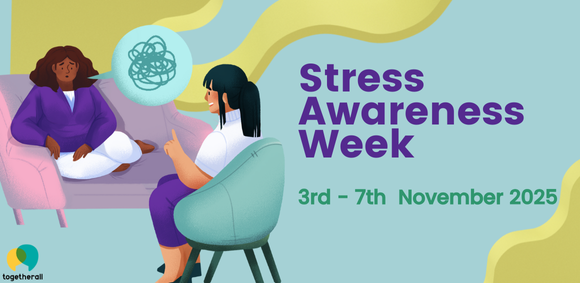International Stress Awareness Week is an annual event held from the 3rd – 7th November 2025, dedicated to raising awareness about stress, its impact, and how to manage it effectively. In today’s fast-paced world, stress can feel unavoidable—draining our energy, affecting our health, and taking a toll on our overall well-being. With 79% of adults in the UK experiencing stress at least once a month, it’s clear that stress is a common part of life, however it doesn’t have to be a constant companion. Join us this week as we explore what stress is and ways that you can manage it!
Understanding Stress
Stress is your body’s natural reaction to challenging or intimidating situations. It triggers the body’s “fight or flight” response, releasing hormones like adrenaline and cortisol to help us react quickly to situations that require focus and energy. Stress can be caused by a variety of things for example work pressures, relationship challenges, health issues, financial difficulties, or major life changes.
It’s important to also note that not all stress is harmful. In fact, manageable levels of stress can boost motivation and improve performance, helping individuals focus and reach their goals. However, when stress becomes excessive and persistent, it can start to take a toll on both your mental and physical well-being.
How stress can affect the body
Stress doesn’t just affect you mentally it can also affect you physically. Here are some of the symptoms that can occur alongside stress:
- Sweating
- Headaches
- Sudden weight gain or weight loss
- Fatigue
- Feeling sick, dizzy, or fainting
- Heart palpitations
- Indigestion or heartburn
- Body soreness
- High blood pressure
- Chest pains
Tips for managing stress.
- Stay active – physical exercise releases endorphins, which can help reduce stress. Even a short walk can make a positive impact!
- Improve time management – poor time management can lead to you feeling overwhelmed and stressed. Using tools like planners, apps and to-do lists can help you stay organized and in control.
- Taking breaks – Regular breaks can help you recharge, reset, and prevent burnout.
- Get a good night’s sleep – sleep is vital for stress management, self-regulation, and your overall wellbeing.
- Practice Mindfulness and meditation – apps such as headspace and calm have guided breathing exercises and meditations, which aim to promote relaxation, improve sleep, and reduce stress.
- Social support – connecting with friends or family can provide emotional support and help you talk out your stress and figure out the root problem.
- Hobbies and interests – engaging in activities you enjoy can be a great way to unwind, refocus and relieve stress.
- Limit caffeine and alcohol – excessive amounts of caffeine and alcohol can increase stress levels.
In conclusion, while stress is an unavoidable part of life, it doesn’t have to take control. By raising awareness and actively practicing stress reduction strategies, we can improve our overall well-being and better manage the challenges life throws at us!
Support and resources for CAW students
As a student of The College of Animal Welfare, you get FREE access to a wide variety of resources and support via the togetherall app; there is a great short online course on how to better manage you emotions. Togetherall also has forums so you can discuss any worries with others, and access to trained counsellors 24/7. If you haven’t set up an account, you can do so FREE of charge with your CAW email address.
If you are struggling with your mental health or any aspect of college life, remember you can access up to six confidential counselling sessions free of charge: full details can be found here.

